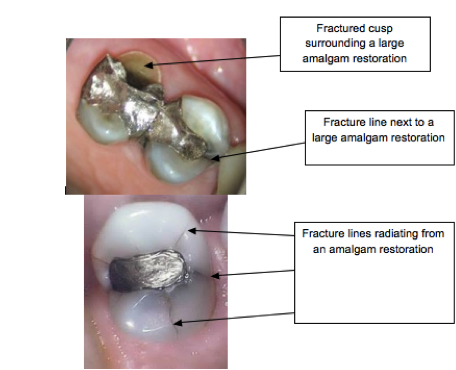Should you replace your old metal fillings (and when)?
When should I replace my old amalgam/metal fillings? We recommend replacing any amalgam restoration that displays signs of leakage, that is adjacent to a fracture, that has tooth decay around or beneath it, or if it is causing a significant cosmetic issue. We evaluate old amalgam restorations very closely with visual examination, probing, x-rays, and intraoral photography. Should I replace my old amalgam/metal fillings because they are dangerous or have mercury? There are no consistent scientific findings confirming that the mercury in amalgam restorations causes specific long-term health issues. There is anecdotal evidence suggesting the mercury may be harmful, and this is an ongoing debate in dental research. At this time, we do not recommend replacing metal/amalgam restorations simply because you have

When should I replace my old amalgam/metal fillings?
We recommend replacing any amalgam restoration that displays signs of leakage, that is adjacent to a fracture, that has tooth decay around or beneath it, or if it is causing a significant cosmetic issue. We evaluate old amalgam restorations very closely with visual examination, probing, x-rays, and intraoral photography.
Should I replace my old amalgam/metal fillings because they are dangerous or have mercury?
There are no consistent scientific findings confirming that the mercury in amalgam restorations causes specific long-term health issues. There is anecdotal evidence suggesting the mercury may be harmful, and this is an ongoing debate in dental research. At this time, we do not recommend replacing metal/amalgam restorations simply because you have them, but replacing them when there are dental and/or cosmetic reasons that will benefit your teeth.
How long do amalgam and composite restorations last?
This is difficult to answer because there are many factors that influence the longevity of a restoration including the size of the restoration, compliance with routine examinations and professional cleanings, home care, etc. Generally, if restorations are well taken care of, amalgam and composite restorations have similar longevity. If any restoration has been in your tooth for 15+ years, it is a successful restoration with above-average longevity.
We are happy to offer composite restorations exclusively at our office. Composite restorations have become far superior to amalgam/mercury restorations and are the modern standard of care. If you have any questions about your existing restoration, please let us know!
The post Should you replace your old metal fillings (and when)? appeared first on Blog – Polished Dental in Pittsburgh.
SOURCE: Blog – Polished Dental in Pittsburgh – Read entire story here.








